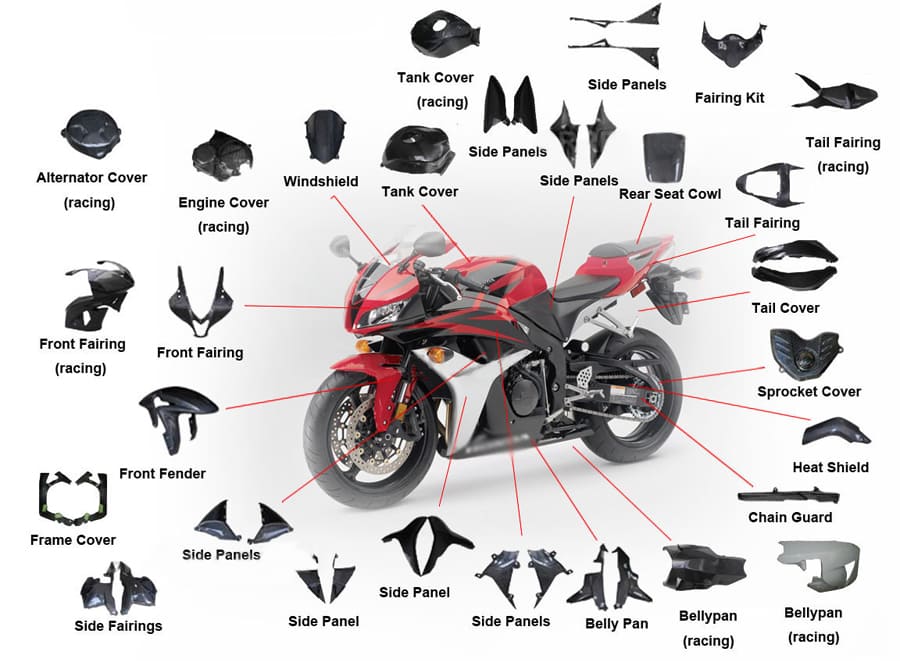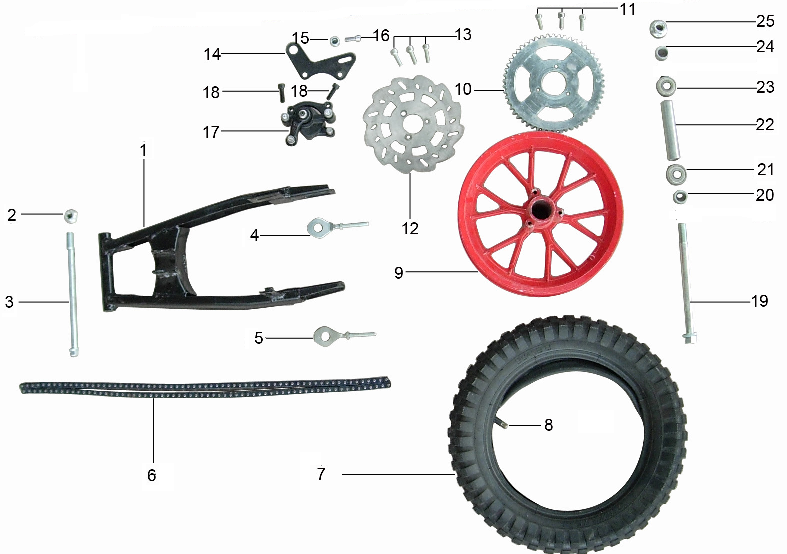Discover the Crucial Motorcycle Parts You Need for Optimum Efficiency
Comprehending the important parts of a motorcycle is essential for accomplishing peak efficiency. Each part, from the engine to the stopping system, plays an essential duty in overall capability and safety and security. Normal maintenance can protect against unforeseen failings and enhance the riding experience. Nevertheless, many motorcyclists ignore the ins and outs of these systems. Uncovering how they collaborate can bring about a much more reliable trip. What vital components should every motorcyclist prioritize?
The Engine: The Heart of Your Bike
The engine acts as the core component of a motorbike, driving its performance and defining its abilities. It is liable for transforming fuel right into mechanical energy, which powers the bike onward. Different kinds of engines are employed, consisting of single-cylinder, V-twin, and inline arrangements, each offering distinct features suited for different riding functions and styles. The engine dimension, normally gauged in cubic centimeters (cc), considerably influences efficiency, with bigger engines usually providing more power and torque.Furthermore, the engine's design and technology, such as fuel injection systems or air-cooling versus liquid-cooling, affect performance and dependability. Upkeep is crucial for peak operation; elements like routine oil modifications and monitoring stimulate plugs assurance long life. Motorcyclists commonly take into consideration an engine's responsiveness and level of smoothness, as these qualities enhance the general riding experience. Eventually, the engine remains an important aspect that defines not only the motorbike's efficiency however likewise the motorcyclist's link to the device.
The Transmission: Shifting Gears Efficiently
The transmission plays an important duty in a motorcycle's efficiency, specifically in the auto mechanics of gear changing. Understanding how to shift gears smoothly can enhance the total riding experience, while normal maintenance assurances peak capability. Proper attention to these aspects can substantially affect the long life and effectiveness of the motorcycle.

Gear Shifting Mechanics
Smooth gear changing is essential for suitable motorbike performance, considerably influencing both acceleration and control. The mechanics of equipment moving involve the communication in between the clutch, gear bar, and transmission system. When a cyclist engages the clutch, it disengages the engine from the transmission, permitting an equipment modification without damaging the parts. A well-timed release of the clutch, combined with specific motion of the gear bar, assists in a seamless adjustment in between equipments. This process assures that the engine runs within its finest power band, boosting performance. Bike Parts Wellington. Additionally, recognizing the gear proportions and their result on rate and torque can aid motorcyclists make informed selections throughout changes, ultimately adding to an extra receptive and satisfying riding experience
Maintenance Tips Significance
Routine maintenance plays an essential function in ensuring that the transmission system runs efficiently, permitting for smooth equipment changes. Routinely transforming the transmission and checking fluid is essential, as old fluid can bring about boosted rubbing and wear. Additionally, evaluating the clutch for wear warranties peak involvement and disengagement, protecting against slippage during equipment changes. Lubrication of moving components is just as crucial to minimize friction and improve performance. Bike owners need to also check for leakages and unusual noises, as these can show underlying problems. By adhering to these upkeep tips, cyclists can prolong the life expectancy of their transmission system, guaranteeing that gear shifts remain smooth and adding to the total performance of their motorcycle.
The Braking System: Ensuring Safety on Every Trip
Braking systems are basic elements that straight affect a motorbike's safety and security and performance. They contain different parts, including brake pads, blades, calipers, and hydraulic lines, all interacting to guarantee reliable deceleration. The kind of stopping system-- usually either disc or drum-- influences responsiveness and stopping power.Regular maintenance is necessary to promote peak performance; used brake pads can lead to lowered efficiency and raised quiting ranges. Furthermore, the high quality of brake fluid must be checked, as it can take in wetness over time, jeopardizing braking efficiency.Riders must also consider the importance of anti-lock braking systems (ABDOMINAL), which stop wheel lockup during sudden quits, boosting overall security. Correctly functioning brakes are not simply concerning stopping; they impart self-confidence in the motorcyclist, permitting safer navigation with different surfaces. Eventually, a trusted stopping system is important for delighting in every trip with satisfaction.
The Suspension: Enhancing Comfort and Control
A well-functioning shock absorber greatly adds to a motorcycle's general efficiency, complementing the performance of the stopping system. The suspension plays a considerable function in soaking up shocks from unequal surfaces, ensuring a smoother ride while keeping tire contact with the road. This get in touch with is essential for both stability and control, allowing cyclists to browse corners with self-confidence and precision.Different kinds of suspension systems, such as telescopic forks or mono-shocks, use differing degrees of convenience and handling. Properly tuned suspension enhances responsiveness, supplying the motorcyclist with an extra connected feel to the motorbike. Regular upkeep checks are vital to identify the suspension elements, including dampers and springtimes, are working at their best. A reliable suspension system not just boosts the riding experience but additionally adds to the longevity of various other motorcycle components by lessening wear and tear. As an outcome, buying top quality suspension is crucial for look at this now any kind of major motorbike fanatic.
The Tires: Linking You to the Roadway
Tires play an important duty in a motorcycle's efficiency, working as the primary web link in between the rider and the roadway. Comprehending the different kinds of tires readily available can significantly affect managing and security. In addition, normal upkeep is important to ensure peak tire efficiency and longevity.
Tire Enters Explained
How do different tire kinds influence a motorbike's performance? Tire kinds play an important role in figuring out a motorbike's stability, hold, and handling. Sporting activity tires, designed for high performance, offer improved traction and responsiveness on smooth roadways, making them suitable for competing and aggressive riding. Conversely, touring tires focus on resilience and comfort, supplying a smoother experience for long-distance travel. Off-road tires, identified by their tough tread patterns, excel in grip on unpaved surface areas, appropriate for adventure fanatics. In addition, dual-sport tires blend characteristics from both on-road and off-road groups, satisfying flexible riding needs. Inevitably, choosing the appropriate tire kind is important for maximizing performance, ensuring safety and security, and improving the general riding experience.
Maintenance Tips Offered
While riding when driving, preserving excellent tire condition is essential for security and efficiency. On a regular basis checking tire pressure is necessary, as under-inflated tires can result in inadequate handling and enhanced wear. It is suggested to inspect walk deepness frequently; worn tires compromise grip and security. Additionally, cyclists ought to try to find indications of damages, such as bulges or splits, which can suggest the demand for substitute. Rotating tires periodically ensures also wear, boosting durability. Keeping tires tidy from debris and preventing too much curbs can extend their life-span. Keeping correct positioning and equilibrium adds to come to a head efficiency, minimizing stress on various other bike elements. Adhering to these upkeep ideas will significantly boost the total riding experience.
The Gas System: Sustaining Performance and Efficiency
The fuel system plays an essential duty in making the most of a motorcycle's efficiency and efficiency, as it assures the optimal shipment of fuel to the engine. It makes up a number of essential components, including the fuel storage tank, gas pump, fuel filter, and gas injectors or carburetor. Each component should work properly to assure a smooth and effective ride.The gas container stores gas and provides it to the engine by means of the fuel pump, which generates the required stress. A gas filter stops pollutants from entering the engine, while the injectors or carburetor mix fuel with air for combustion.Proper maintenance of the gas system is essential; a clogged filter or malfunctioning injector can bring about reduced efficiency and boosted fuel intake. By validating that the fuel system operates effectively, cyclists can delight in better throttle feedback, far better fuel economic climate, and in general boosted riding experience.
The Electric System: Powering Your Experience
An efficient electric system is important for Go Here the total functionality and safety and security of a motorcycle, as it powers critical elements such as the ignition, lighting, and various digital systems. This system includes the battery, which stores energy, and the generator, in charge of producing power while the engine runs. The circuitry harness connects these parts, guaranteeing reputable power distribution.Additionally, integrates secure the system from overloads, while relays aid control high-current devices with low-power signals. A well-kept electric system enhances efficiency by making sure smooth starts and regular operation of signals and lights, crucial for motorcyclist visibility and safety.Regular checks of the battery's cost and links are essential for protecting against electrical failings. Cyclists should additionally examine wiring for deterioration, making certain all components work preferably. Inevitably, a durable electrical system contributes significantly to the total performance and integrity of the next motorcycle.
Frequently Asked Concerns
How Commonly Should I Replace My Motorbike's Battery?
The frequency of motorcycle battery replacement relies on use and upkeep (Motorbike Components NZ). Typically, batteries need to be changed every three to five years. Regular checks can help recognize when a replacement is necessary for peak performance
What Tools Do I Need for Fundamental Bike Maintenance?
For fundamental bike upkeep, one needs crucial devices such as a socket collection, wrenches, screwdrivers, pliers, tire pressure gauge, and a torque wrench. These devices promote reliable maintenance and assure the bike runs effectively and securely.
How Can I Improve My Motorcycle's The rules of aerodynamics?
To boost bike aerodynamics, one must consider changing fairings, using windshield expansions, maximizing body position, and reducing overall weight. These alterations aid lessen drag, improving security and gas performance throughout adventures.
What Are the Indications of a Failing Electric System?
Indicators of a falling short electrical system consist of lowering lights, problem starting, irregular tool analyses, and blown merges. Oem Parts New Zealand. Uncommon scents or corrosion around battery terminals may additionally indicate underlying concerns needing instant attention for safety and performance

Exactly how Do I Choose the Right Oil for My Bike?
When choosing oil for a motorcycle, one should take into consideration the producer's specifications, thickness scores, and the sort of riding. Furthermore, traditional versus artificial oil can affect efficiency and engine protection, affecting the decision greatly. The engine dimension, usually measured in cubic centimeters (cc), significantly influences efficiency, with bigger engines typically providing more power and torque.Furthermore, the engine's layout and innovation, such as gas injection systems or air-cooling versus liquid-cooling, influence efficiency and integrity. A well-functioning suspension system significantly adds to a motorcycle's general efficiency, complementing the performance of the braking system. The gas system plays an important function in making the most of a motorbike's performance and performance, as it guarantees the ideal delivery of fuel to the engine. A gas filter avoids impurities from getting in the engine, while the injectors or carburetor mix gas with air for combustion.Proper maintenance of the gas system is important; a clogged filter or malfunctioning injector can lead to reduced efficiency and raised fuel consumption. A well-maintained electrical system improves efficiency by ensuring smooth begins and constant procedure of signals and lights, vital for motorcyclist exposure and safety.Regular checks of the battery's cost and connections are vital for stopping electric failings.